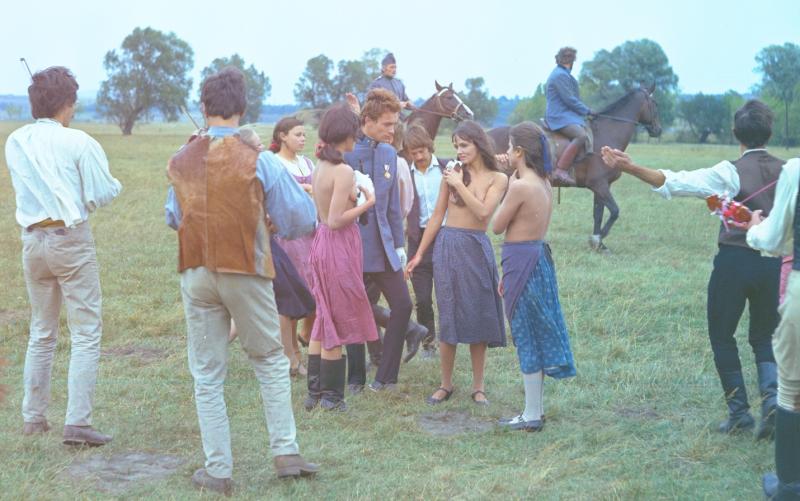DVD: Red Psalm | reviews, news & interviews
DVD: Red Psalm
DVD: Red Psalm
Miklós Jancsó 's opaque Hungarian screen poem mystifies anew

They don’t make films like Red Psalm any more. They rarely made them then either. In Red Psalm (1971), Miklós Jancsó imagined a corner of a Hungarian field in 1898 in which the forces of revolution were pitted against the uniformed, armed and often mounted might of the establishment. But unlike a regular piece of schlock-heroic agitprop, Jancsó envisions an encounter that is somewhere between a ballet and a debate, a folk opera and a game of toy soldiers.
Rather than simply shout at or shoot one another, his peasant protagonists and young soldiers engage in stylised argument. One side spouts Engels and sings "La Marseillaise", the other denigrates the concept of workers’ rights. Jancsó was a true believer but, for all his film’s finally triumphal lionisation of the spirit of socialism, it did not find favour with the authorities. In a sleeve essay whose erudition is typical of Second Run DVD’s output, Peter Hames reports that it was criticised for “anarchistic formalism, cynical use of nudity and petit bourgeois pessimism”. The cynical nudity features three young women who drift across the screen like the Three Graces, emblems not so much of sexuality as spiritual and moral purity. When one of them is shot through the hand - it's by no means the only act of ritual violence in the film - her red palm becomes the film’s signature emblem of bloodied idealism.
Red Psalm feels almost like a parody of a certain kind of East European cinema that flourished in the 1960s when directors were encouraged to experiment by both the spirit of the age and the parameters placed upon their freedom of expression. It gave rise to dreamy symbolism and impacted opacity that is not, nowadays, for all tastes. In truth, no one has ever really known what Red Psalm means, so those who venture anew into Jancsó’s seductive labyrinth should not feel at a disadvantage.
Watch short clips from Red Psalm
rating
Explore topics
Share this article
The future of Arts Journalism
You can stop theartsdesk.com closing!
We urgently need financing to survive. Our fundraising drive has thus far raised £49,000 but we need to reach £100,000 or we will be forced to close. Please contribute here: https://gofund.me/c3f6033d
And if you can forward this information to anyone who might assist, we’d be grateful.

Subscribe to theartsdesk.com
Thank you for continuing to read our work on theartsdesk.com. For unlimited access to every article in its entirety, including our archive of more than 15,000 pieces, we're asking for £5 per month or £40 per year. We feel it's a very good deal, and hope you do too.
To take a subscription now simply click here.
And if you're looking for that extra gift for a friend or family member, why not treat them to a theartsdesk.com gift subscription?
more Film
 A House of Dynamite review - the final countdown
Kathryn Bigelow's cautionary tale sets the nuclear clock ticking again
A House of Dynamite review - the final countdown
Kathryn Bigelow's cautionary tale sets the nuclear clock ticking again
 theartsdesk Q&A: Idris Elba on playing a US President faced with a missile crisis in 'A House of Dynamite'
The star talks about Presidential decision-making when millions of lives are imperilled
theartsdesk Q&A: Idris Elba on playing a US President faced with a missile crisis in 'A House of Dynamite'
The star talks about Presidential decision-making when millions of lives are imperilled
 Urchin review - superb homeless drama
Frank Dillane gives a star-making turn in Harris Dickinson’s impressive directorial debut
Urchin review - superb homeless drama
Frank Dillane gives a star-making turn in Harris Dickinson’s impressive directorial debut
 Mr Blake at Your Service review - John Malkovich in unlikely role as an English butler
Weird comedy directed by novelist Gilles Legardinier
Mr Blake at Your Service review - John Malkovich in unlikely role as an English butler
Weird comedy directed by novelist Gilles Legardinier
 Don't Let's Go to the Dogs Tonight review - vivid adaptation of a memoir about a Rhodesian childhood
Embeth Davidtz delivers an impressive directing debut and an exceptional child star
Don't Let's Go to the Dogs Tonight review - vivid adaptation of a memoir about a Rhodesian childhood
Embeth Davidtz delivers an impressive directing debut and an exceptional child star
 One Battle After Another review - Paul Thomas Anderson satirises America's culture wars
Leonardo DiCaprio, Teyana Taylor, and Sean Penn star in a rollercoasting political thriller
One Battle After Another review - Paul Thomas Anderson satirises America's culture wars
Leonardo DiCaprio, Teyana Taylor, and Sean Penn star in a rollercoasting political thriller
 Steve review - educator in crisis
Cillian Murphy excels as a troubled headmaster working with delinquent boys
Steve review - educator in crisis
Cillian Murphy excels as a troubled headmaster working with delinquent boys
 Can I get a Witness? review - time to die before you get old
Ann Marie Fleming directs Sandra Oh in dystopian fantasy that fails to ignite
Can I get a Witness? review - time to die before you get old
Ann Marie Fleming directs Sandra Oh in dystopian fantasy that fails to ignite
 Happyend review - the kids are never alright
In this futuristic blackboard jungle everything is a bit too manicured
Happyend review - the kids are never alright
In this futuristic blackboard jungle everything is a bit too manicured
 Robert Redford (1936-2025)
The star was more admired within the screen trade than by the critics
Robert Redford (1936-2025)
The star was more admired within the screen trade than by the critics

Add comment